- Home
- Harlan Ellison
Angry Candy Page 24
Angry Candy Read online
Page 24
Garth ruminated a moment longer, then said, "I will watch as you set the return mechanism. Do it now."
The old man went to a console of heat-sensitive controls, and Lord Garth stood over him as he explained the calibrations. "Set it for one hundred years from today." The old man tapped out the proper coding, and the date appeared in a liquid-crystal display. Garth studied the console, and when he seemed satisfied he waited till the Professor had walked away from the mechanism and followed him back to the transmission stage.
The Professor stood waiting next to a single knife-switch. "Now what do you do to send me?" the Lord asked.
The Professor motioned to the switch. "Just this, my Lord, and it is done."
Garth mounted to the transmission stage with one step, and stood bathed in the cone of orange light. "Send me away," he said quietly. "And remember, Professor: You are not alone."
There was smoldering hatred on the Professor's face for an instant as he threw home the knife-switch, and it was the true face Garth had known he would see in that final moment. He smiled with satisfaction. As the orange light flickered, he raised the stinger and squeezed the trigger. An explosive dart erupted from the weapon, struck the Professor in the left eye and, as the laboratory wavered and dimmed around him, Garth saw the old man's face erupt and the headless body thrown half across the room.
Now your wives and children need never fear, he thought. Nor need I. Concealing the location of the pharaoh's grave with the execution of the grave diggers was always de rigueur.
All through the Experimental Buildings, down the corridors, to the subbasements, in the walls, the power of the time-stress warpers throbbed and hummed, the sound rising as the orange light that washed him grew stronger and the world of the sixty Brother Lords grew as ephemeral as clouds seen in a lake.
He felt a thin pain throughout his body, as if he were being sliced neatly by a giant scalpel . . .
The light strobed brilliantly. And then the transmission stage was empty. And then the automatic cutoff killed power to the banks of warpers. And then the laboratory was empty save for the smoking ruin that had been an old man. And Lord Garth of the Red Hand had drunk deeply from the time stream.
He drew a breath that scored his throat raw, and opened his eyes. For an instant he saw nothing, and the pain was cataclysmic. Then he swallowed and tried to get his heart to beat more slowly; and sight came back; and he was standing up to his ankles in water. His gold-thread boots were soaked.
It was marshland. Reedy grass rose all around him.
He could look off across the floodplain to granite mountains that rose on the horizon. The sun was a melting bronze ball. To his right, very near, gigantic cycads stood in a forest crush that dominated the area. The palm trees had thick, unbranched columnar trunks. Thirty feet above his head, huge, leathery fronds formed a violently green canopy that blotted out the sunlight.
All around him in the water stood the sauropods. He had materialized in the middle of the herd. Massive bodies seventy feet long, gray-green hide all around him, sunk with their vast tonnage in the moist earth, fifteen-foot-long necks, their ridiculously small heads high in the foliage, risen on their hind legs, tearing at the fronds thirty feet overhead.
The sound of the instant of his arrival was the crack of lightning as air was displaced.
Directly above him the apatosaurus started at the report, twisted its great sinewy neck, and the projectile-shaped head plummeted toward Lord Garth.
In the instant of awareness as he saw the terrifying open mouth with its rows of long, narrow teeth rushing toward him, he had no time to scream, and only half enough time to think: But it only eats vegetation!
Nor did the gargantuan herbivore eat meat. As its great jaws clamped themselves onto Garth's upper torso, masticating his head and shoulders between its pencil-like teeth, the dinosaur understood in its dim way that the new food it had found growing in the marsh grass was not a tender new kind of vegetation.
And from a height it dropped the unpleasant thing. It had needed to sample. To reject.
Lord Garth had fallen from a great height, bearing with him the answer to the question the Professor had often asked: Did dinosaurs think?
The answer was yes. But not quickly.
THE FIRST ONE Pen Robinson killed came to his attention partially through the good offices of the Manhattan branch of the Federal Bureau of Investigation. He had been holding a dusty copy of Burkes Peerage when they took him into custody.
They came for him — two frosty agents who had bought their suits at the same Big & Tall Men's Shop — just after two-thirty on Saturday. The bookstore — "just off Broadway, rare books and technical texts in Good Condition" — was busier than usual because of the two Puerto Rican boys who had approached him the previous Monday as he was unlocking the shop. They had braced him, suggesting a way in which he — Meester Robinson of Robinson's Good Used Books — could attract new business, "guaranteed absolutamente" For a small fee, they would undertake to slip under the windshield wipers of every automobile parked between Eighth Avenue and Park, between 42nd and 59th Streets, a flier advertising whatever Meester Robinson wanted to push that week.
Pen had gone to the Kinko instant print shop on Lexington, and had ordered three thousand fliers extolling the arcane virtues of books scented with shelf dust and written by men and women who had vanished into the lonely posterity of the Dewey Decimal System.
The boys had been as good as their word, and mailboxes, doorways, lunch counters — and windshields — had worn his fliers throughout the week. Pen had paid them gladly; and Saturday was busier than usual when the FBI chilled the doorknob of the shop, entering to take him into custody.
One moment he had been standing there, dusting Burkes Peerage, and the next he was crossing the sidewalk on 51st Street, being sternly guided by a cold hand, slipping as effortlessly as an exhalation, into the velour darkness of the black limo double-parked in front of the shop. Fifteen minutes later he was somewhere in the towering abyss of the Pan Am building, seated in a moderately comfortable knockoff of an Eames design, being punctiliously but courteously questioned by a man half his age. Pen Robinson, at age fifty-five, looked no older than forty; and his judgment of the inquisitor's youth may have been faulty. He was under no misapprehension about the quality of the man's eyes, however.
He thought, I'm glad I never have to look out of those eyes. He knew he would not like the world seen from that side.
"You called a bicycle shop in Queens yesterday," said the wearer of the bad eyes.
"Uh, yes . . ." Pen was wary.
"Why did you call that number, Mr. Robinson?"
"It was a wrong number."
"Whom," he said precisely, "were you looking for at that number?"
Pen furrowed his brow. He had no idea where this was going. "They said they were from the FBI. The men who brought me here. I never asked to see their identification. I suppose it's against the law to say you're from the FBI if you're not. Are you really the FBI?"
The young man neither nodded nor blinked. "Whom were you seeking at that number, sir?"
"Maybe I ought to ask to see your credentials. I don't even know your name . . . there's nothing on the door out there. How do I know you're —"
The young man leaned forward, resting his pale, freckled hands on his desk blotter. The desk was empty of all but the leather-framed blotter, and a pair of pale, freckled hands. "You don't want to get yourself in any deeper, do you, Mr. Robinson? You're only here for a visit; you understand that the liaison we share, at the moment, does not involve the possibility of arrest, imprisonment, detainment, any of that. You understand that, don't you?"
Pen was frightened. People vanished, it happened all the time; and not just in Latin American dictatorships. Right here in the United States, it could happen: Judge Crater, hundreds of children every year, Jimmy Hoffa. And those who vanished into apparats controlled by people who spent their time spying on one another. There had to be hidde
n places where the vanished were taken. And from there to other locations . . . from which one never returned . . . or if you did, the years would have been stolen, and your loved ones would never recognize you . . . to come back as an old, old man they did not know. There were no loved ones: Pen was alone in the world. But that only made it worse. If they decided he would never return, who but the New York State tax assessor would try to find him?
"Look, I don't know what this is all about," he said, trying to get back to whatever safe place he had unknowingly abandoned. "But this is all crazy; it's a mistake of some kind. Why don't I just tell you what that call was about."
"Why don't you tell me that, Mr. Robinson." No resonance: flat silver panes of reflective glass.
So he told him how inconsequential it had been.
"I bought a library at an estate sale. From an agent in Detroit. It was one of the last elements of the dissolved estate of a man who had worked for GM for many years. I was told there were hundreds of technical journals and books of design." He paused a beat to clarify. "My store specializes in technical texts."
The eyes blinked. Pen took that as encouragement.
"I was opening the crates . . . so I could catalogue what had come. I was slapping them."
Another blink. Pen was beginning to get the drill: he clarified.
"Slapping them. Flat banging two books together to get the dust off them. Then I turn each one upside down and riffle the pages; for good measure. A check fell out of one of them. I picked it up, and it was a check that had been written by a man named Henry Chatley. The address was in Queens. It was a perfectly good check drawn to cash, in the amount of something like one hundred and fifty dollars. It was only two weeks since it had been written, it was a check someone could cash. I called the number on the face of it. A man answered and said it was some bicycle repair shop. I thought I'd mis-dialed, and called back, and got the same man. I dialed very carefully the second time. So I didn't know what to do."
The mouth beneath the eyes moved. "How did it get there?"
"How did what get there? The shop, the man, what?"
"The check, Mr. Robinson. How did the check get into that book?"
"How am I supposed to know?"
"You say you bought these books from the library of a man who lived in Detroit."
"Yes. He died, and they liquidated his assets to pay outstanding taxes."
"This was an old book?"
Pen shrugged. "I didn't check the copyright, but I'd say it had been in his library for years, yes, I think I can say that."
"What was the title of this book, that you say the check fell from?"
"I'm not saying it fell, it did fall. I didn't make this up!" He felt anger rising despite his caution. "And what if I am making it up, what's the problem here? I did a decent thing, I made a good samaritan phone call; I got a number that had been changed. Obviously, that's the answer. What is it you think this is all about?"
"I don't think it's about anything, sir. I'm asking a few questions."
There wasn't anything to say to that, so Pen sat and waited. It had to stop sometime; perhaps now.
"So you don't know Henry Chatley."
Pen said, very seriously, sitting forward and placing his hands opposite the pale, freckled pair: "I wouldn't know Henry Chatley if he walked through that door. I have never met a Henry Chatley; I have never heard of a Henry Chatley; and I wish to god I'd never seen his damned check! Now does that satisfy you? Have I been here long enough for you to run me through your computers or whatever you do, long enough for you to understand I'm a used bookseller and not Ashenden the Secret Agent?"
The young man with the bad eyes said nothing. He looked at all the parts of Pen's face, as if certain duplicity would reveal itself in dark lines if he applied enough visual pressure. Finally, he said, "Thank you, Mr. Robinson."
Pen was astonished. It was over, as abruptly as that. His inquisitor obviously meant for him to go.
"That's it?" he said. Now he was annoyed. It seemed he should have ended with a bit more fanfare . . . something!
"That's it, sir."
"Not even going to tell me what this has been about, are you? Not even a word, right? Just let me march out and find my way back to my place of business, from which you dragged me for this waste of time!"
"Goodbye, Mr. Robinson." The door opened behind him, and he felt a chill. The cold hand touched him again, and he knew it was time to get up, now, right now, and go with the agent.
Three minutes later, he was on the street.
He was hailing a cab when it hit him. How did that two-week-old check, written on a New York bank, by a man whose phone number had been changed with such impossible swiftness that it had already been reassigned to a bicycle repair shop in Queens, get into a book that had sat on an old man's bookshelf in Detroit for possibly decades? And who the hell was Henry Chatley?
In the cab going back uptown, he felt as if he stood poised before a membrane. Where he stood, on this side, it was the real world, the mimetic universe, a place of order, even if this thing with the FBI made no sense, was something out of Alice. On the other side, through that translucent curtain, lay a great many small items, only imperfectly seen, but probably very important. Where the check had come from, how it had gotten into the book, who Henry Chatley was . . . or had been. He had an overwhelming sense of certainty that Henry Chatley, whoever, wherever, was dead.
But how to get through the membrane?
He needed a trope, a metaphor, a puff of smoke, a rabbit for the hat. Twenty minutes later, back in the shop, near to closing time, the rabbit manifested itself.
While he had been at the Pan Am building, his clerks had tended to the benefits proffered by the two Puerto Rican boys. The shop was empty.
He decided to lock up early, cleared the cash register, gave out the paychecks, and watched as the clerks wandered up the street, seeking weekend euphoria. He stared out the front window for a time, then locked the doors and stared out the window for a longer time. In all, it had been only twenty minutes, yet in that time he had resisted the impulse to find the book again: not once, but a hundred times.
Finally, he went back into the storeroom, to the stack of books he had removed from the crate the day before. He had not lied to the inquisitor. He really didn't know which book it had been. When the check had floated to the floor, he had laid the book on the stack beside the crate, and had taken no further notice of it. If all was as it had been, the book should still be there.
It was. One of the clerks had placed a folded newspaper atop the stack, but otherwise, everything was as it had been. He picked up the book. Elements of Structural Design, with a copyright notice of 1926. Pen held the book in both hands, and stared at it; then, as he flipped the pages, he discovered two more pieces of paper.
The first was part of a press release for a book titled Tian Wen: A Chinese Book of Origins. It had been torn off, possibly having been used as a bookmark. It bore an excerpt from the twenty-three-hundred-year-old Taoist catalogue of mythology, philosophy and pre-Imperial legend. It read as follows:
1
Of the beginning of old,
Who spoke the tale?
2
When above and below were not yet formed,
Who was there to question?
3
When dark and bright were obscured,
Who could distinguish?
He had no idea what it meant. He never understood such riddles, though apparently entire nations found the words urgently meaningful. The only one of such epigraphs that had ever made sense to him was: The oxen are slow, but the Earth is patient. That seemed peculiarly appropriate now, even if the three excerpts from Tian Wen were not.
So he continued flipping the pages of the book, and came, at last, to the stiff file card wedged into the spine fold. Printed on the card were the words CHATLEY and WHERE THE WOODBINE TWINETH. Under these words, written in a fine hand, with an ink pen, was the direction Take by truck, co
rner 82nd and Amsterdam, Friday, 7:17 pm.
He took the IRT uptown to 79th and Broadway, and walked quickly to 82nd and Amsterdam. He expected to find a shop, or an apartment, or something that related. He found nothing but the dead faces of apartment buildings as night fell.
But he knew he had been intended to find something. However the three seemingly disconnected pieces of paper had found their way into that book, he understood in his meat and bones that it was he, Pen Robinson, who had been meant to discover the puzzle, and to solve it. He had never been a mystic, lived life surely in the pragmatic universe of shelf dust and self-prepared meals after work, and knew there was a logical explanation waiting for him here on the corner of 82nd Street and Amsterdam Avenue.
He loitered. He leaned against a wall and studied the street. Nothing, for the longest time. He looked to the rooftops, and then to the filthy New York sky. Nothing, for a longer time. He felt his eyes closing. He knew he shouldn't be weary, nothing really exhausting had happened to him that day. Perplexing, emotionally taxing, but not truly something to make the flesh sag. But the waiting was beginning to take its measure of him.
And the rabbit came again.
Across the street, directly opposite his station, a pale blue light pulsed softly from the stairwell leading down to a basement apartment. He studied it for a while, and then slowly walked across 82nd to the apartment building. He looked over the wrought iron railing, leaning between heavy black plastic bags of garbage waiting for the truck some distant morning. In the stairwell, lying on his back, was a man with a hole in his chest. From the hole pulsed a distressingly blue light, and as Pen watched, the hole expanded slightly, and the glowing light colored the man's anguished face. He was in terrible pain.
Pen walked to the gate in the railing, slipped the latch, and walked down the stone steps to the filthy bottom. He knelt beside the man, and looked into his face. "Henry Chatley," he said. He knew who this had to be.
The man looked up at him, and nodded with the tiniest movement. "You found the termination order," he said, the words sighing from between lips that barely moved.

 Repent, Harlequin! Said the Ticktockman
Repent, Harlequin! Said the Ticktockman Broken Glass
Broken Glass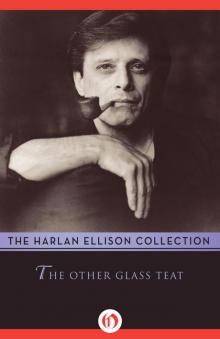 Other Glass Teat
Other Glass Teat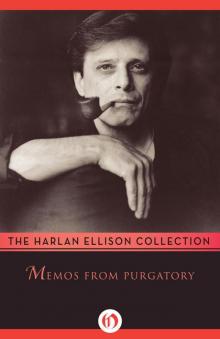 Memos From Purgatory
Memos From Purgatory I Have No Mouth and I Must Scream
I Have No Mouth and I Must Scream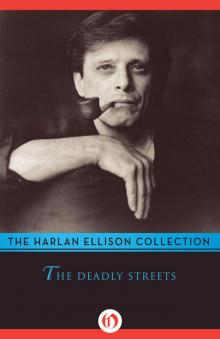 The Deadly Streets
The Deadly Streets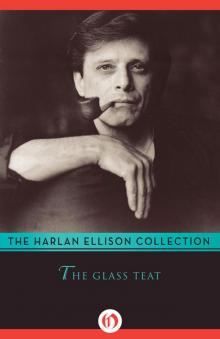 The Glass Teat
The Glass Teat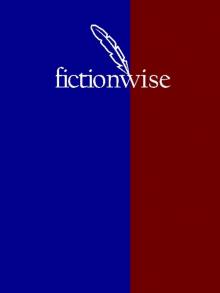 Paingod and Other Delusions
Paingod and Other Delusions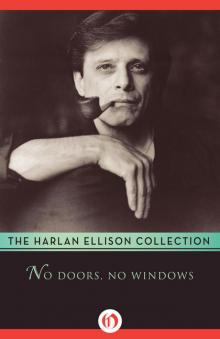 No Doors No Windows
No Doors No Windows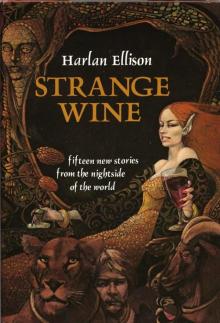 Strange Wine
Strange Wine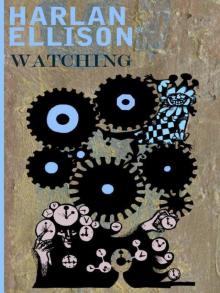 Harlan Ellison's Watching
Harlan Ellison's Watching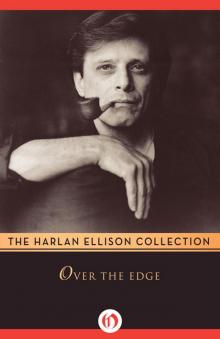 Over the Edge/An Edge in My Voice
Over the Edge/An Edge in My Voice Troublemakers: Stories by Harlan Ellison
Troublemakers: Stories by Harlan Ellison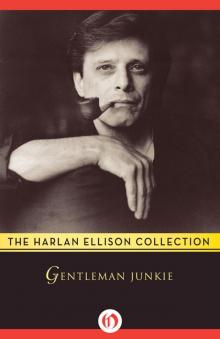 Gentleman Junkie and Other Stories of the Hung-Up Generation
Gentleman Junkie and Other Stories of the Hung-Up Generation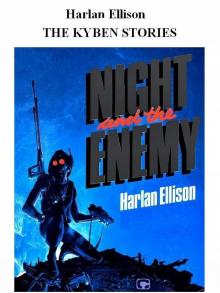 The Kyben Stories
The Kyben Stories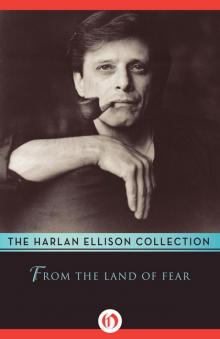 From the Land of Fear
From the Land of Fear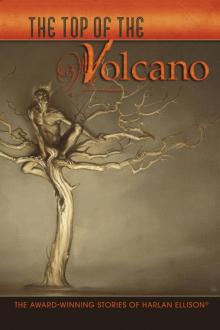 The Top of the Volcano: The Award-Winning Stories of Harlan Ellison
The Top of the Volcano: The Award-Winning Stories of Harlan Ellison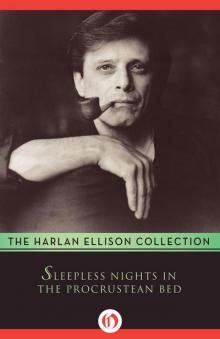 Sleepless Nights in the Procrustean Bed
Sleepless Nights in the Procrustean Bed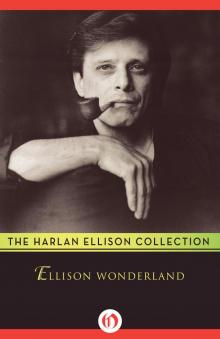 Ellison Wonderland
Ellison Wonderland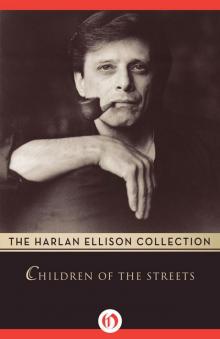 Children of the Streets
Children of the Streets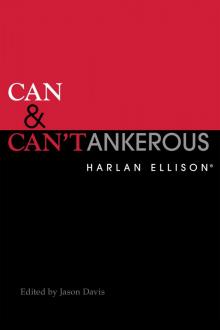 Can & Can'tankerous
Can & Can'tankerous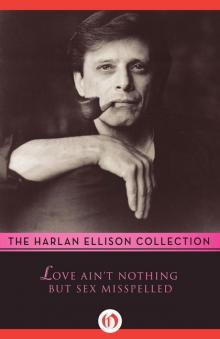 Love Ain't Nothing but Sex Misspelled
Love Ain't Nothing but Sex Misspelled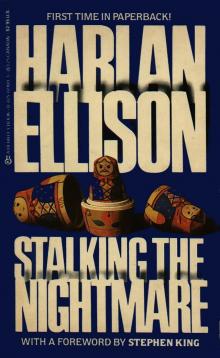 Stalking the Nightmare
Stalking the Nightmare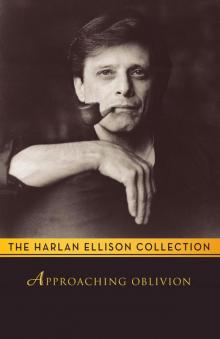 Approaching Oblivion
Approaching Oblivion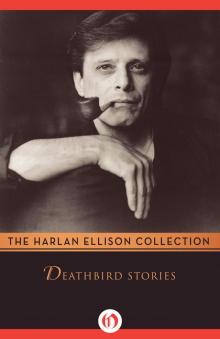 Deathbird Stories
Deathbird Stories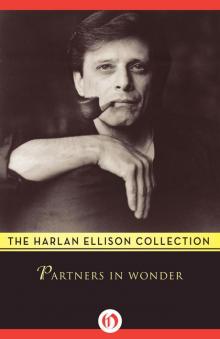 Partners in Wonder
Partners in Wonder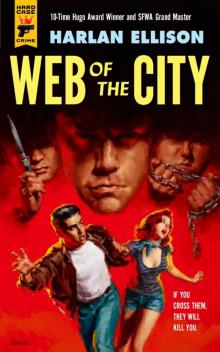 Web of the City
Web of the City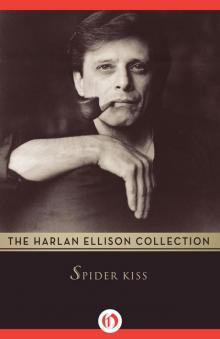 Spider Kiss
Spider Kiss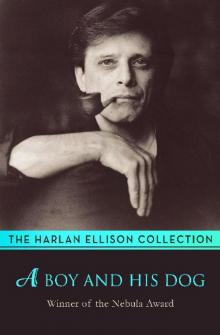 A Boy and His Dog
A Boy and His Dog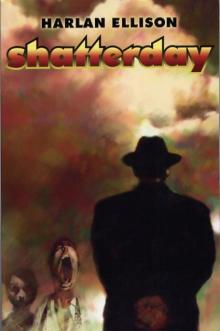 Shatterday
Shatterday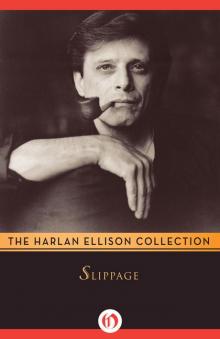 Slippage: Previously Uncollected, Precariously Poised Stories
Slippage: Previously Uncollected, Precariously Poised Stories Repent, Harlequin! Said the Ticktockman
Repent, Harlequin! Said the Ticktockman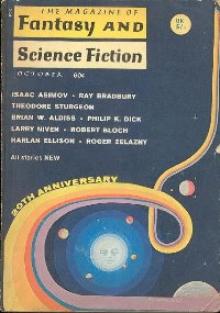 Come to Me Not in Winter's White
Come to Me Not in Winter's White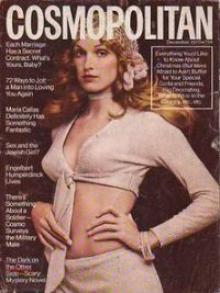 The Song the Zombie Sang
The Song the Zombie Sang The Other Glass Teat
The Other Glass Teat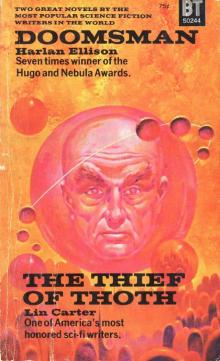 Doomsman - the Theif of Thoth
Doomsman - the Theif of Thoth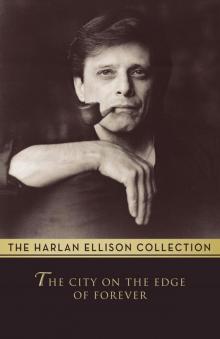 The City on the Edge of Forever
The City on the Edge of Forever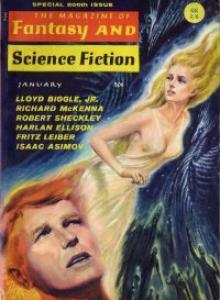 I See a Man Sitting on a Chair, and the Chair Is Biting His Leg
I See a Man Sitting on a Chair, and the Chair Is Biting His Leg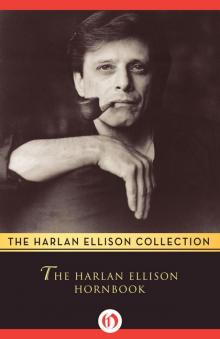 The Harlan Ellison Hornbook
The Harlan Ellison Hornbook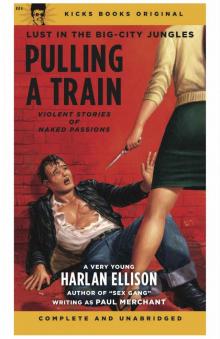 Pulling A Train
Pulling A Train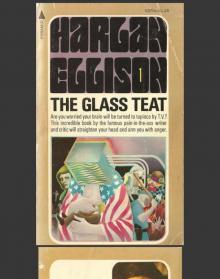 The Glass Teat - essays of opinion on the subject of television
The Glass Teat - essays of opinion on the subject of television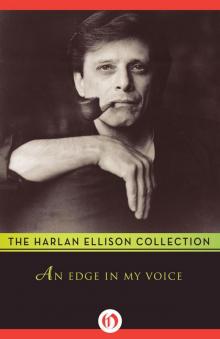 An Edge in My Voice
An Edge in My Voice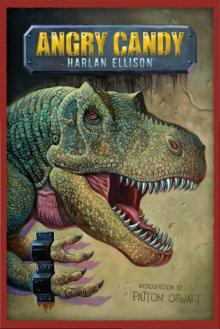 Angry Candy
Angry Candy Troublemakers
Troublemakers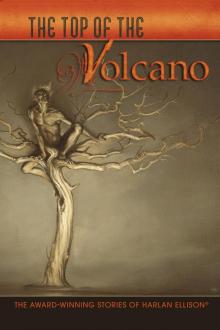 The Top of the Volcano
The Top of the Volcano Over the Edge
Over the Edge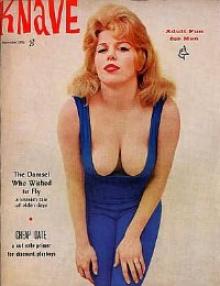 Survivor #1
Survivor #1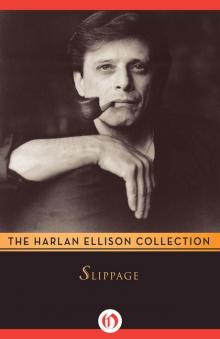 Slippage
Slippage